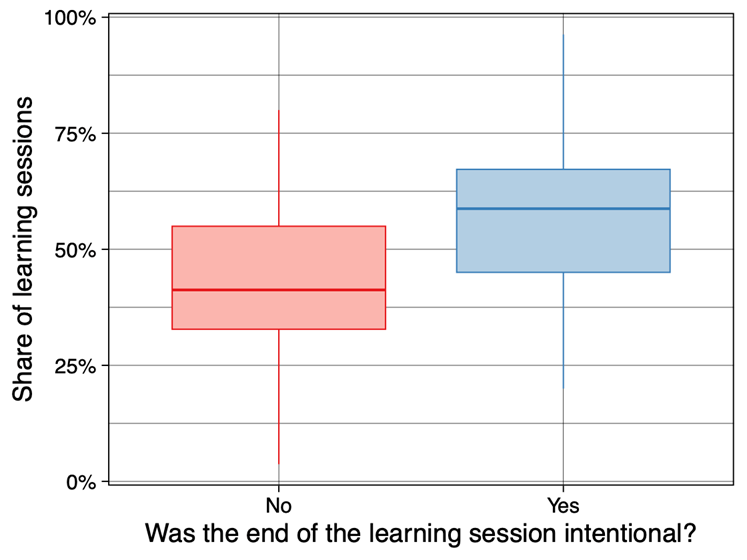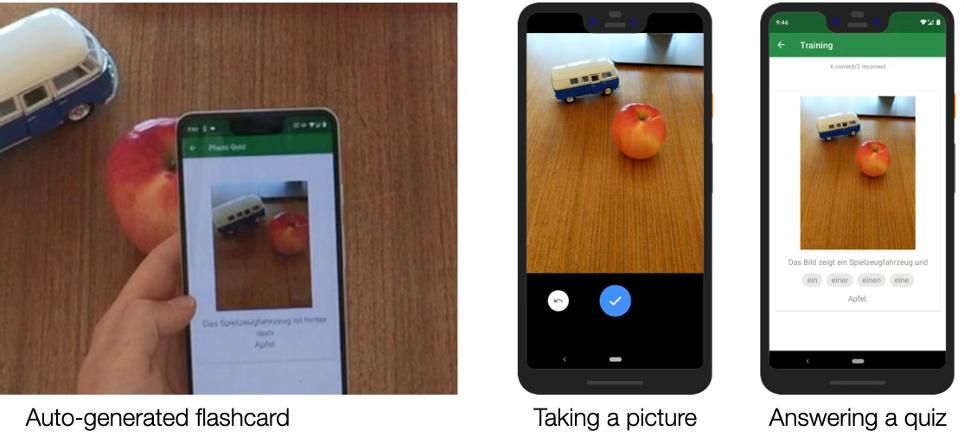On the 16th of October 2023, I successfully defended my PhD thesis with the title “Designing Intelligent Support for Learning From and In Everyday Contexts”.
My work focused on the relationship between language learners and their context and environment and how we can design the learning experience. Below, you’ll find a summary of the research questions I addressed.
Motivation and engagement in learning benefit from a good match of learning settings and materials to individual learner contexts. This includes intrinsic context factors such as prior knowledge and personal interests but also extrinsic factors such as the current environment (see Figure 1). Recent developments in adaptive and intelligent technology enable the personalisation of context-aware learning. For example, computer vision algorithms, machine translation, and Augmented Reality make it possible to support the creation of meaningful connections between learners and their context. However, for successful adoption in everyday life, these technologies also need to consider the learner experience.

This thesis investigates the design of personalised context-aware learning experiences through the lens of ubiquitous and self-directed language learning as a multi-faceted learning domain. Specifically, it presents and discusses the design, implementation, and evaluation of technology support for learning in and from learners’ everyday contexts with a strong focus on the learner perspective and user experience. The work is guided by four different roles that technology can take on in context-aware ubiquitous learning: For enhancing learning situations, it can (1) sense and (2) trigger in learners’ everyday contexts. For enhancing learning contents, it can (3) augment activities and (4) generate learning material from learner everyday contexts.
With regards to the sensing role, the thesis investigates how learners typically use mobile learning apps in everyday contexts. Activity and context logging, combined with experience sampling, confirm that mobile learning sessions spread across the day and occur in different settings. However, they are typically short and frequently interrupted (see Figure 2). This indicates that learners may benefit from better integrating learning into everyday contexts, e.g. by supporting task resumption.

Subsequently, we explore how this integration could be supported with intelligent triggers linked to opportune moments for learning. We conceptualise and evaluate different trigger types based on interaction patterns and context detection. Our findings show that simple interactions (e.g. plugging in headphones) are promising for capturing both availability and willingness to engage in a learning activity. We discuss how similar interaction triggers could be adapted to match individual habits.
In the area of enhancing learning contents, we first investigate how enjoyable everyday activities could be augmented for learning without disrupting these activities. Specifically, we assess the learner experience with interactive grammar support in e-readers and adapted captions for audio-visual media (see Figure 3). Participants in our studies felt that the learning augmentations successfully supported their learning process. The information load of the learning support should match the learners’ current needs to maintain the activity flow. Learners may need encouragement to opt for novel concepts optimised for learning (e.g. time-synchronised captions) rather than sticking to habits (e.g. standard captions).


Next, the thesis explores learner needs and preferences in generating their own personalised learning material from their context (see Figure 4). We design and evaluate automated content generation methods that generate learning opportunities from objects in the learner’s environment. The connection to the learner’s context is established with state-of-the-art technology, such as object detection and Augmented Reality. Through several user studies, we show that learning performance and engagement with auto-generated personalised learning material is comparable to predefined and manually generated content. Findings further indicate that the success of personalisation depends on the effort required to generate content and whether the generation results match the learner’s expectations.
Through the different perspectives examined in this thesis, we provide new insights into challenges and opportunities that we synthesise in a framework for context-aware ubiquitous learning technology. The findings also have more general implications for the interaction design of personalised and context-aware intelligent systems. Notably, for the auto-generation of personalised content, it is essential to consider not only correctness from a technological perspective but also how users may perceive the results.

